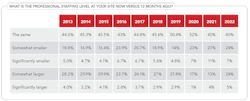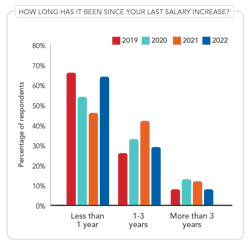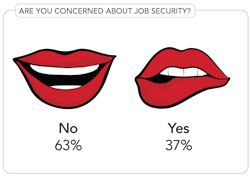If hiring is any indication, chemical engineering professionals are having a good year. During the early days of the pandemic, respondents to our annual job satisfaction and salary survey reported some hiring and pay freezes took effect, but now a switch has flipped. Nearly 30% of respondents to this year’s survey — 12% more than last year — shared staffing levels at their sites are somewhat or significantly larger than the previous year (Figure 1). For some context, from year-to-year, it’s unusual to see more than a 2–3% variation in any particular response to our salary survey questions, so any 10%+ increase certainly deserves noting. One respondent even shared, “Our department has doubled in the past 6 months. The new hires are receiving an extremely high starting salary.”
“[My] salary adjustment (increase) to better match current market was appreciated. Recent hiring difficulties, largely due to salary, seem to be making a difference in wanting to retain existing expertise,” added another.
Indeed, salaries are quite competitive in the frenzied job market. This year, chemical engineering professionals reported an average salary of $121,513 (Figure 2), a significant jump from the pandemic-induced $106,000 reported last year and the highest average salary we’ve ever recorded in the 17 years we’ve been conducting this survey.
“The survey stops at $150K+, but the industry is paying upwards of $200K to $250K plus bonuses, this artificially lowers the average compensation,” advised one commenter. In fact, the highest percentage of respondents (nearly 30%) report making more than $150,000 per year.
“Salary compensation is a little below what I would prefer, but the benefits from the company are good.”
BONUS BONANZA
Another financial perk with positive numbers is bonuses and raises, both of which fell slightly in 2021 only to recoup in 2022. For example, in 2021, 46% reported receiving a salary increase within the last year. In 2022, that number rose to 64% (Figure 3). In addition, of those that received a salary adjustment, only 2% took a pay cut, compared to 6% in the middle of the pandemic.“I recently received a large raise. Before this, I was undercompensated,” revealed
one commenter.
“I am not unhappy with the compensation, but it could be better. My last raise was unusually high. They are typically much less and not merit-based,” mentioned another.
For 2022, salary survey participants revealed an average raise of 4.16%, which falls more in line with 2020’s 4.12% and certainly better than last year’s 3.7%. The average bonus for the last several years has hovered around $6,000, but for 2022, respondents reported hefty bonuses with the average increasing to $7,480, another record number. Many, nearly 38%, received bonuses exceeding $10,000, the highest amount we tally (Figure 4).
“I am well compensated, and the bonus program when maxed out allows me to double my salary,” shared one participant. Another claimed the compensation and benefits are “well worth it. Good base salary. Excellent 401k and contributions, great perks, and a bonus equal to over 30% of annual salary.” Most respondents had similar positive remarks:“I am pleased with my salary, bonuses, benefits package and grateful for a good pension.”
“I am satisfied with my compensation and the opportunity to receive a bonus which is directly impacted on how I perform with all the divisions in our company.”
“Have been very happy with compensation and benefits and feel that job performance is taken into consideration.”
In fact, nearly 70% (Figure 5) of respondents said they feel they’re adequately compensated for the work they perform (compared to 66% in 2021).
CHALLENGES AND CONCERNS
While results are favorable regarding overall job satisfaction, comments voicing displeasure — mostly attributed it to being underpaid — had some respondents revealing they left jobs to get their salary up to par.
“[I’m] seriously underpaid vs. market; management is learning that via inability to hire new engineers at the salary they are offering. No clue if this will be addressed before all experienced staff retires,” grumbled one participant.
“I don’t feel my compensation and benefits [are] high enough and am looking to negotiate a raise before the end of the year; otherwise, will look elsewhere,” warned another.
When it comes to employment, having one foot out the door seems to be the trend. Of those with jobs, more than one-third of respondents (36%) say they’ve been with their employer anywhere from 0–5 years, further highlighting the slew of both employment opportunities and opportunistic job hopping.
The recent hiring uptick also adds to the task of retaining and finding skilled workers. In a January 2022 poll, we asked readers “How tough is it for your site to hire enough skilled craftspeople,” and more than half (56%) of respondents categorized such hiring as moderately difficult.
“I was the guy who you published in last year's salary review who was bellyaching about not getting an increase because my company was overly conservative about the pandemic. Because the company did well and the fact that our competitors were poaching our people, they gave our engineers an across-the-board 15% raise to stop the bleeding. So, it ended up working well for me, but our company lost a lot of people before that.”
As employees leave, those that stay often are stuck managing those jobs on top of their own — leaving personnel stretched thin with more work and longer hours. On average, 50% note they work 41–50 hours a week, followed by another 20% clocking anywhere from 51 hours to more than 70 hours a week. The pandemic also reportedly increased workloads by as much as 22%.
Even before this labor crisis, our survey consistently tracked the long days as one of the least appealing aspects of working in the chemical engineering field (31%), only topped by lack of recognition (36%) when we asked participants what they dislike about their jobs (Figure 6).
“Be prepared to work long hours, weekends and holidays. You will be away from home a lot,” warned one respondent.
“Compensation and benefits are quite good, but the workload is not manageable and little recognition of extra effort put in to meet the demands,” voiced one participant.Many respondents also shared another concern — that recent cost-of-living (COL) salary adjustments don’t keep pace with the current levels of inflation and insurance premiums, making them barely adequate.
“Compensation is generally good; however, COL increases have not kept up with recent inflation increases,” said one commenter.
“Compensation is not keeping up with inflation, real buying power results in 5% pay cut currently,” relayed another.
“After not having any salary raise for the past four years, and with inflation going sky high, my compensation is lower than I expected,” added another commenter.
“At the moment, there seems to be no movement on adjusting salaries to keep up with inflation,” shared another.
THUMBS UP“Working for the chemical industry is a pretty good gig,” said Martha Gilchrist Moore, chief economist and managing director, Economics and Statistics at the American Chemistry Council in her 2022 Mid-Year Situation & Outlook webinar hosted by Chemical Processing. In her presentation, she had good news to share: even with inflation, labor market and supply chain issues, chemical output and employment will continue to grow.
This might explain why job security concerns are at their lowest levels with 63% stating they’re unconcerned about job loss, a 10% jump from 2021 (Figure 7). In fact, when we asked, “what are the chances you’ll be laid off or fired in the next two years,” 75% say none or just a very slight chance (Figure 8).Adding to this, 92% of our respondents report their employment status as “working full time,” compared to just 79% last year and 88% in 2020.
With that, job satisfaction also is at an all-time high. Last year, 89% were at least somewhat satisfied with their jobs. It’s now ticked up to 91% (Figure 9).The top three factors contributing to job satisfaction (Figure 10) continue to be the high level of challenging work (66%), the salary and benefits (59%) and rapport with colleagues (50%).
“Find a job that you get satisfaction and work-life balance from rather than basing it on salary only,” advised a respondent.
One even gave a shout out to its employer: “Dow Chemical is top tier in compensation and benefits. I’m very lucky to work for them.”
Take a Look Back
Chemical Processing has been conducting an annual salary/job satisfaction survey for more than 15 years! For a look back at past surveys, visit any one of these conveniently listed links:
2021 — https://bit.ly/3sHDv6B
2020 — https://bit.ly/39iASOq
2019 — https://bit.ly/3f8HTD3
2018 — http://bit.ly/2O3n6Xs
2017 — http://bit.ly/2mnxZEo
2016 — http://goo.gl/NOaC4R
2015 — http://goo.gl/YtU0xd
2014 — http://goo.gl/IroA1C
2013 — http://goo.gl/NckQ5c
2012 — http://goo.gl/x00kEt
2011 — https://bit.ly/3DgbgB3
2010 — https://bit.ly/3DgooWJ
2009 — https://bit.ly/3fcEedd
2008 — https://bit.ly/3TL40Er
2007 — https://bit.ly/3fjORuH
2006 — https://bit.ly/3zlABbF
2005 — https://bit.ly/3UbeCMB
About the Author
Amanda Joshi
Managing Editor
Amanda Joshi has more than 18 years of experience in business-to-business publishing for both print and digital content. Before joining Chemical Processing, she worked with Manufacturing.net and Electrical Contracting Products. She’s a versatile, award-winning editor with experience in writing and editing technical content, executing marketing strategy, developing new products, attending industry events and developing customer relationships.
Amanda graduated from Northern Illinois University in 2001 with a B.A. in English and has been an English teacher. She lives in the Chicago suburbs with her husband and daughter, and their mini Aussiedoodle, Riley. In her rare spare time, she enjoys reading, tackling DIY projects, and horseback riding.











